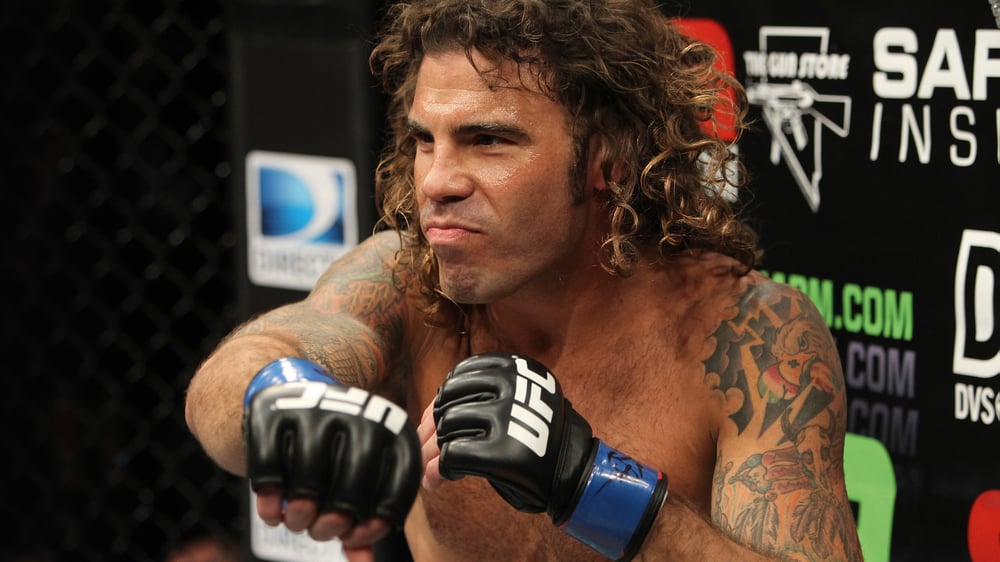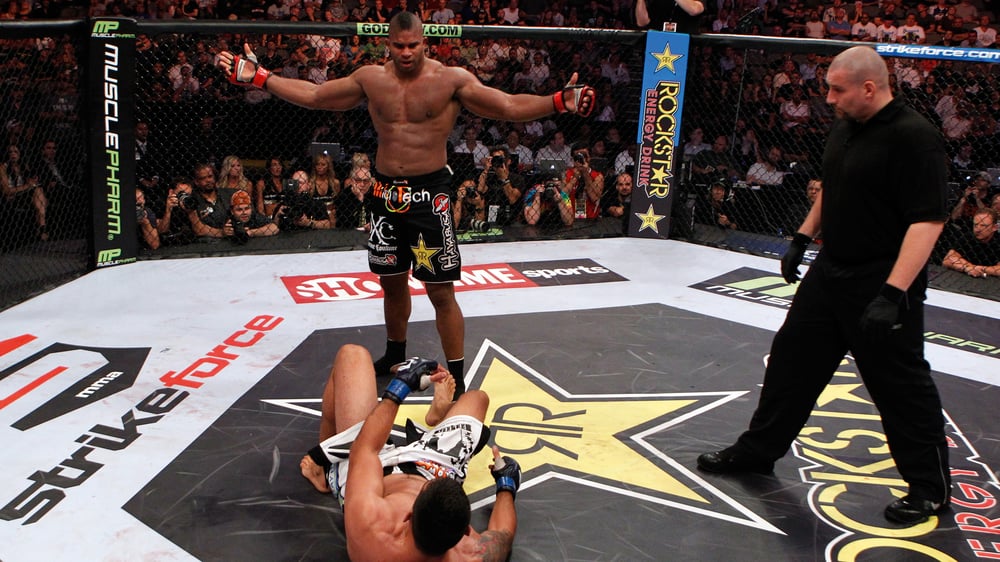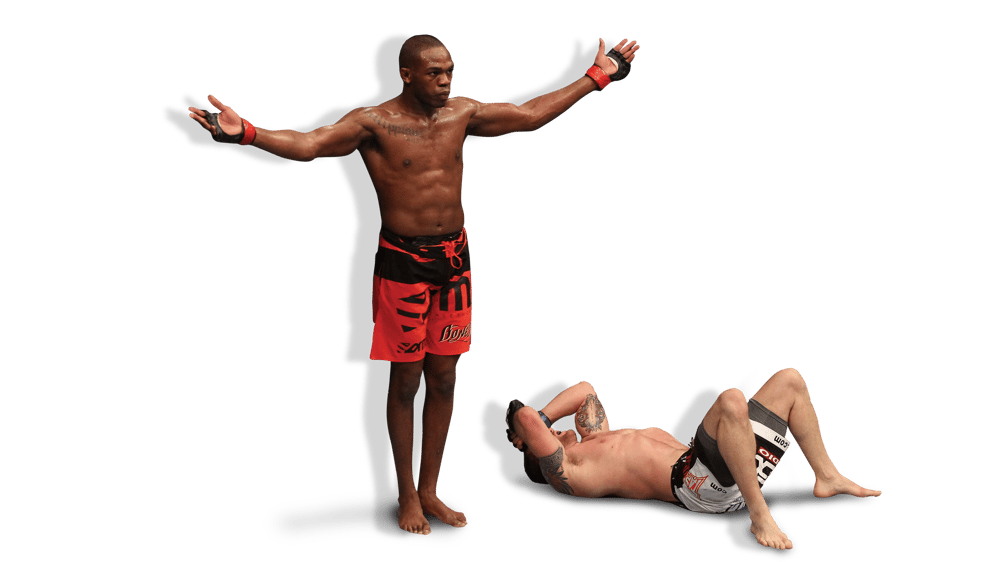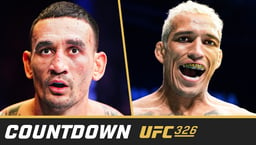
Issue 080
October 2011
‘Fight of the Night’ or drawn-out lay ‘n’ pray points victory – what’s best for your career? Fighters Only investigates…
Tactics like ‘lay n pray’, ‘wall n stall’, and the less common ‘hit and run’ style of are the bane of promoters and fight fans the world over. After all, organizations want both excellent athletes and entertainers. But which approach greater benefits the fighter?
While hardcore fans may deem 15 minutes of technical grappling to be exciting, that is not a sentiment echoed by the bulk of MMA’s audience. Nima Safapour, vice president of business affairs at MC Hammer’s MMA management company Alchemist, says: “Hardcore fans appreciate the ground aspect, regardless of whether it’s boring. But in reality your average fan is the casual viewer, and matchmakers try to cater to them. They are the biggest demographic.”
To continue making money, organizations have to keep finding the next Bonnar vs Griffin, ‘Korean Zombie’ vs Garcia and Barry vs Kongo, while also promoting the elite fighters of the world, regardless of their chosen tactics. The pressure to provide entertainment and world-class quality fights translates from the organizations onto the fighters themselves. Fighting is their livelihood. Considering their careers are naturally limited by the nature of their profession, they need to make as much money as they can, while they can.
They are faced with a tough choice – should they risk all for a victory, thrill the crowd, and accept defeat regularly; or minimize the risks, send the audience to
sleep, but win convincingly and regularly?
To be signed by a high-profile organization it’s necessary to both thrill and win. Brazilian prospect Edson Barboza was signed to the UFC with a 6-0 record that included six stoppages inside two rounds. Another Brazilian, Renan Barao, gained a UFC contract by going on a 26-fight unbeaten run, during which he finished 18 opponents inside the distance. The more finishes you accumulate, the quicker you will be signed. Otherwise, if your record bears blemishes, you better have a reputation as a jiu-jitsu wizard, or brawling fan favorite.
Once top organizations sign you to a contract, what stage you are at in your career matters greatly. Lex McMahon, president of Alchemist, managers of Nate Marquardt and Stefan Struve amongst others, says: “Younger guys work up the pay scales progressively, so whether you’re highly entertaining or not, in the early stages you’re making the same money. Once you develop a track record of success or for entertaining, that is when you reap the rewards.”

That stage is when pressure to excite from organizations is felt most. “The biggest financial reward, especially for younger fighters, is the ‘Fight of the Night’ bonuses,” Nima Safapour acknowledges. “They make a dramatic difference. If you’re earning $6,000–12,000 a fight, and you get a $75,000 bonus, that’s a different realm of earning capacity. That’s the great distinction between an exciting and dull fighter.”
A standard UFC contract offers a base-rate appearance fee, which is then doubled in case of victory. Typically, debutants in the UFC will have a $6k contract, with a further $6k for a win. ‘FOTN’, ‘KOTN’ and ‘SOTN’ awards offer the chance to supplement that income with typically between $30–100k. It is little wonder they are the apple of many a fighter’s eye. Clay Guida has earned $240,000 from his five bonus awards, hugely supplementing his current fee per fight of around $37,000.
But, the comparison of Guida’s standard fight purse to Jake Shields’ is telling. While both fighters are former Strikeforce champions, Guida came into the UFC with a reputation for thrilling, bloody encounters; whereas Shields arrived with a long list of conquests in a 14-fight win streak. After 14 UFC fights working his way up the pay scales, Guida is still only on a $37k+37k (show + win) contract. In his maiden UFC fight against Martin Kampmann, Shields was awarded $75k for his appearance, which was doubled by his victory.

Then there are the cases of Paul Taylor and Gray Maynard. Taylor is 4-5 in the UFC and is the epitome of a fighter who can lose and get second chances because of his all-action style. But after nine fights in the UFC, he remains on an $18k+18k deal. Compare that to Gray Maynard, the lightweight behemoth who is yet to lose. His style was regularly described as ‘dull’ before his five-round draw with Frankie Edgar at UFC 125, yet he now earns in excess of $26k+$26k per fight.
Similarly, Taylor’s UK compatriot Dan Hardy is rarely in a dull fight and has challenged for the UFC welterweight title. Yet, he still earns just $25k+25k per fight. South Korean Dong Hyun Kim was unbeaten until being KO’d by Carlos Condit at UFC 132 recently, and earns in excess of $35k+$35k every time he fights. Those figures show the value of gaining regular victories, regardless of what methods you adopt, for a fighter’s basic pay rate.
Organizations may reward fighters for being exciting with bonuses, but it seems those are necessary to supplement their lower fees than dull-but-successful fighters. In terms of fight purses, it appears you are far better to risk alienating the fans and ensure victory than risk a dramatic knockout.
But, few guys can put together the 14 and eight-fight win streaks of Shields and Maynard. One loss for a snore-fest fighter exhibiting and it is likely they will be out of a job. Scott Coker, founder of Strikeforce, says: “Fighters that entertain will always have a job. There are some great fighters and all they do is lay on you. The average fan doesn’t appreciate that. Fighters that play it safe, eventually if they play it too safe or lose while playing it safe, they could be out looking for work.”

Exciting fighters are not bound by such pressures to win at every opportunity. Fighters like Taylor, Joe Lauzon and Chris Leben only need to register an occasional win to retain their contracts, such is their appeal to fans wanting to see a war. “Joe Silva [UFC matchmaker] is the best promoter in the business, and that’s because he knows how important it is that fans get value for their dollars,” Lex McMahon says.
Successful but boring fighters are assured of a better, regular pay-check, but they risk being out of a job with a single loss, something their exciting counterparts don’t. The more entertaining you are, the more chances you get. And losing at some stage is a near certainty in MMA.
However, entertaining fighters must also be wary of shortening their careers by abusing their bodies too greatly. Take Chuck Liddell and Wanderlei Silva as perhaps the most high-profile examples. And, while they are given more chances, they don’t have nine lives. Lex adds: “For longevity, you have to be able to have both to some degree. It boils down to putting on a show first and foremost, but strategy has to win the day or your career will be short.”
Even exciting fighters’ luck will run out sometime. “You only get so many get out of jail cards,” says Safapour. “The UFC will reward a really exciting fighter once or twice, but not consistently and regularly. Purely for longevity you have to win. If you can win in dramatic fashion, you have a much more sustainable career.”
Another main revenue source for fighters is sponsorship. “More than anything else, sponsors look at whether a fighter is on television, and their chances of success,” Safapour continues. “They want air time to get brand recognition. The first question they ask is, ‘Will my brand get televised?’ Once that’s established then they look for a guy who will produce a dramatic finish.”

There is no definite formula for gaining TV time – proven winners like Jon Fitch are regularly on the main card, but mind-blowing stoppages can get you there too, proven by Dave ‘Pee-Wee’ Herman’s UFC debut on the 131 TV line-up. But to occupy a place high up the bill, and gain yourself the most exposure, you’ve got to win regularly. Heidi Seibert of Zinkin Entertainment, who manages fighters such as Forrest Griffin and Josh Koscheck, says: “Any fighter that would purposely play to their opponent’s strength for the sake of entertainment is making a poor career choice because this sport is about winning fights. You don’t get title fights by losing exciting fights. Fighters that win are always relevant.”
Title fights are where the big money lies, both in terms of sponsorship and bigger fight purses. To get there, winning is a necessity. After all, MMA is a sport. You will get a title fight faster if you are considered to be exciting, but proven winners won’t be denied, irrespective of their styles, as Shields and Maynard have recently proven.
Exciting fighters will be given second and third chances by MMA organizations, and ‘Fight of the Night’ bonuses are great supplements for fan favorites, but without a few wins they won’t last long. Success is the key to long-term financial security in MMA, regardless of how that success comes. If you can find a way to captivate the crowd while racking up wins, you are well on the way to becoming an MMA superstar. If a fighter can’t strike that ideal balance, it’s better to be dull and win than exciting and lose. Just don’t be dull and lose, or you’ll find yourself unemployed far quicker than it takes you to finish a fight.










